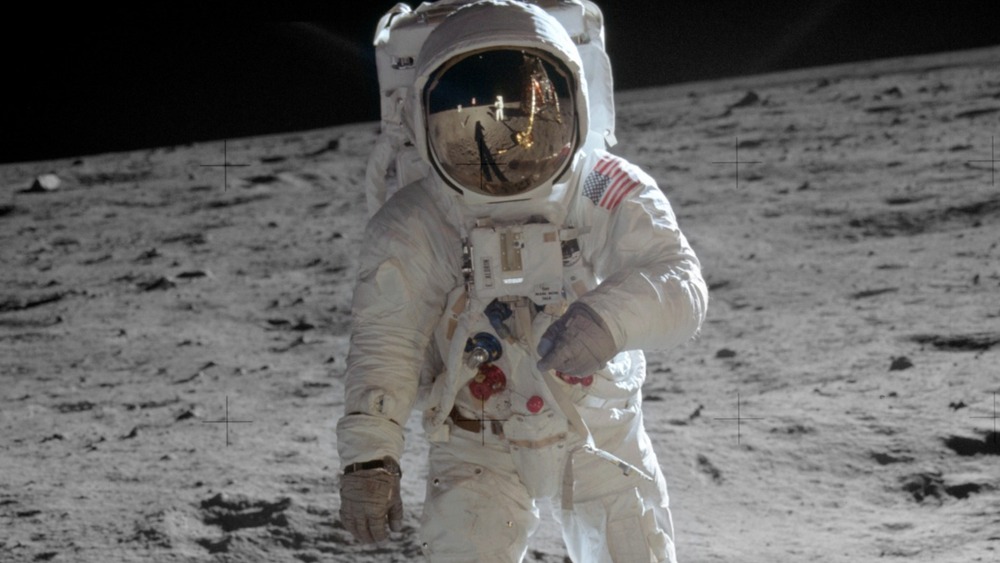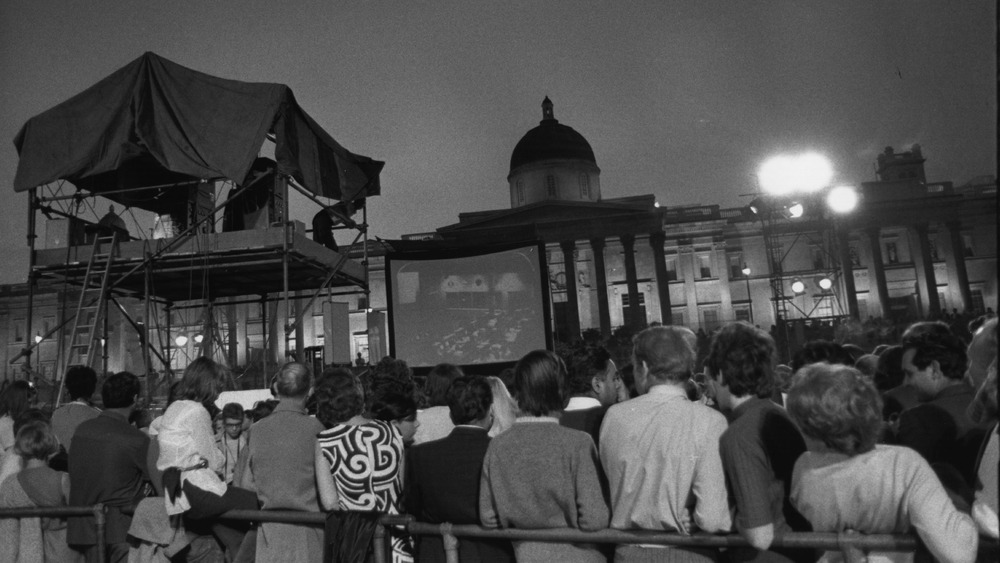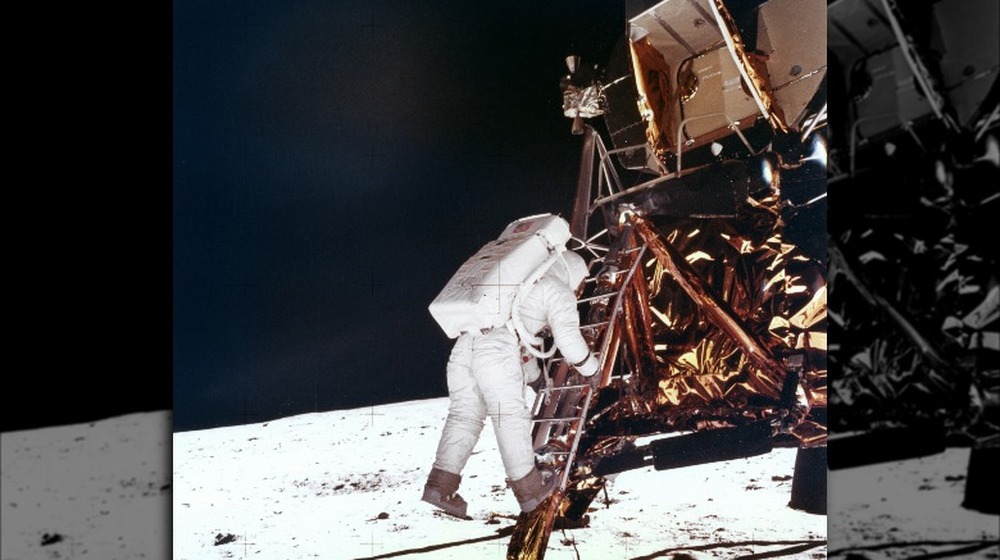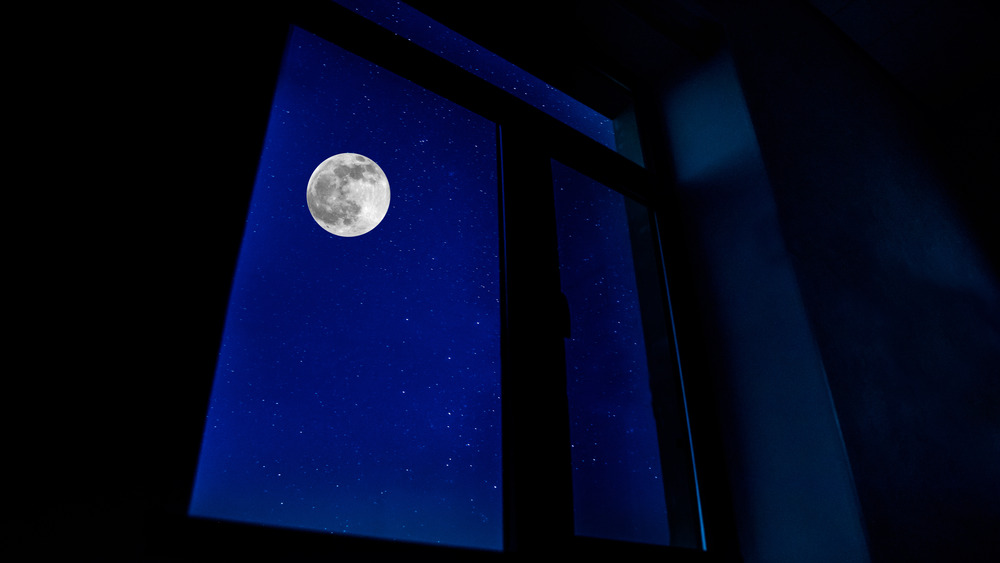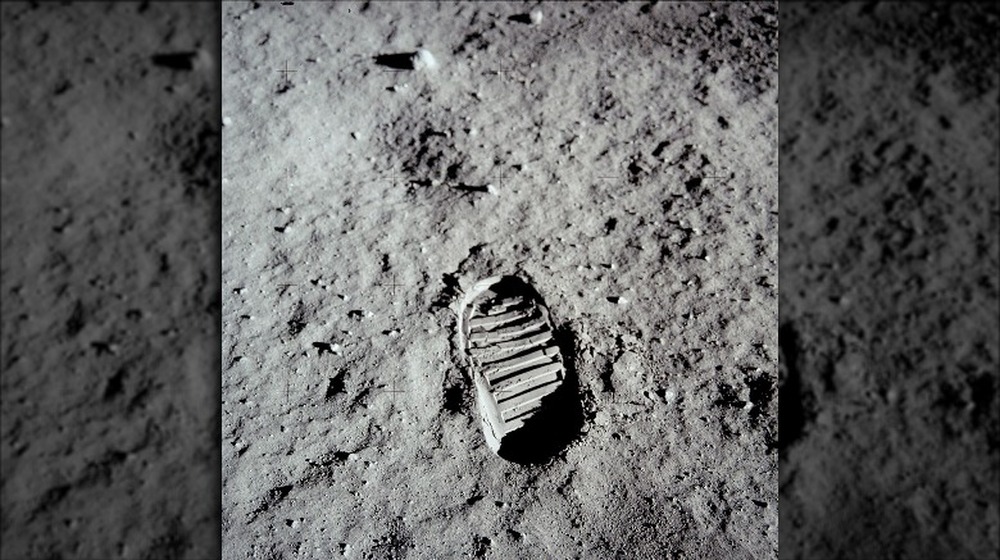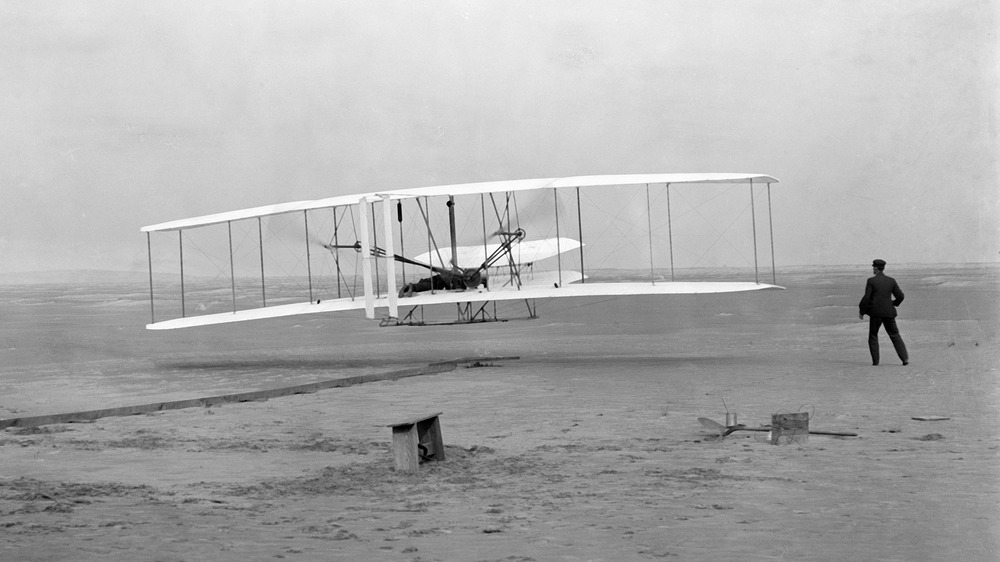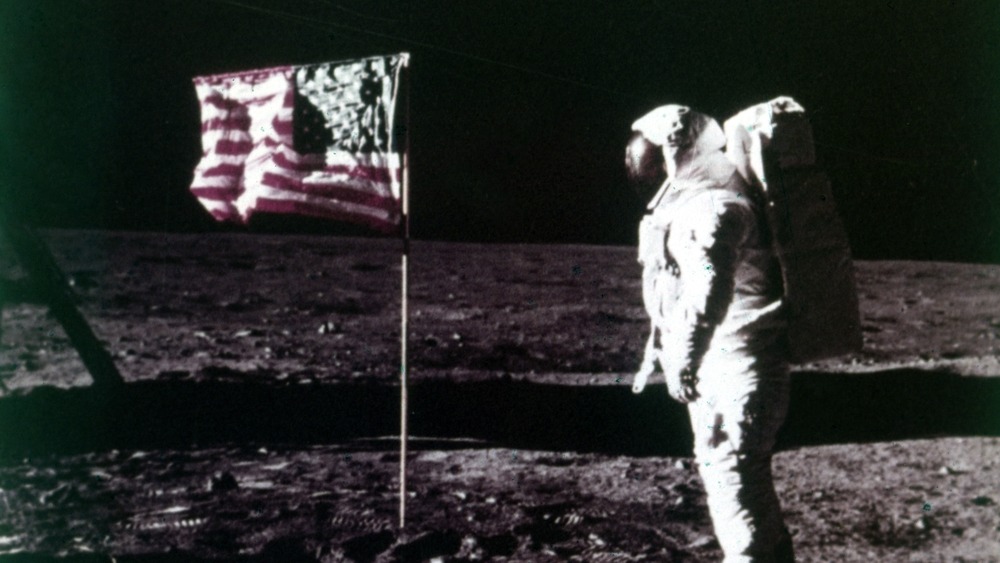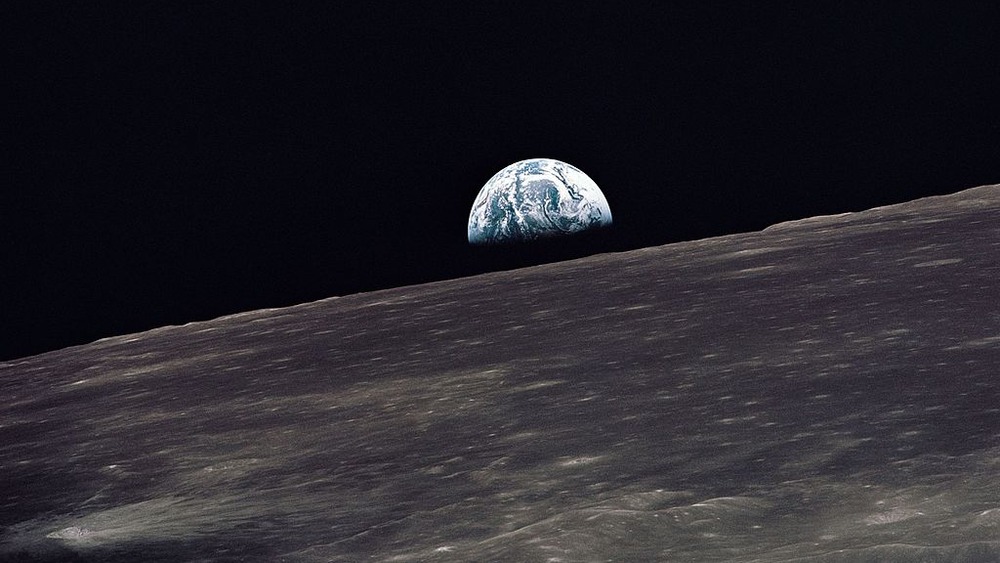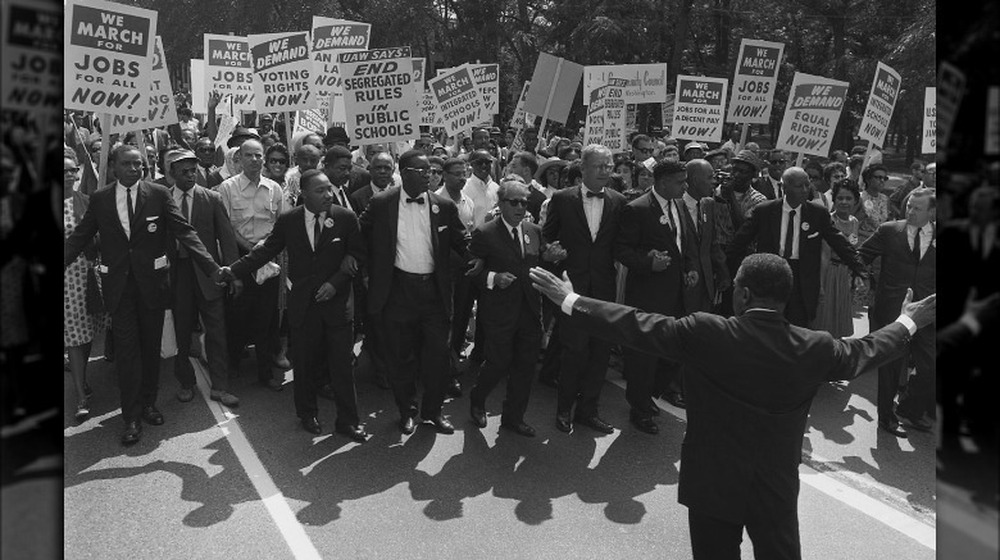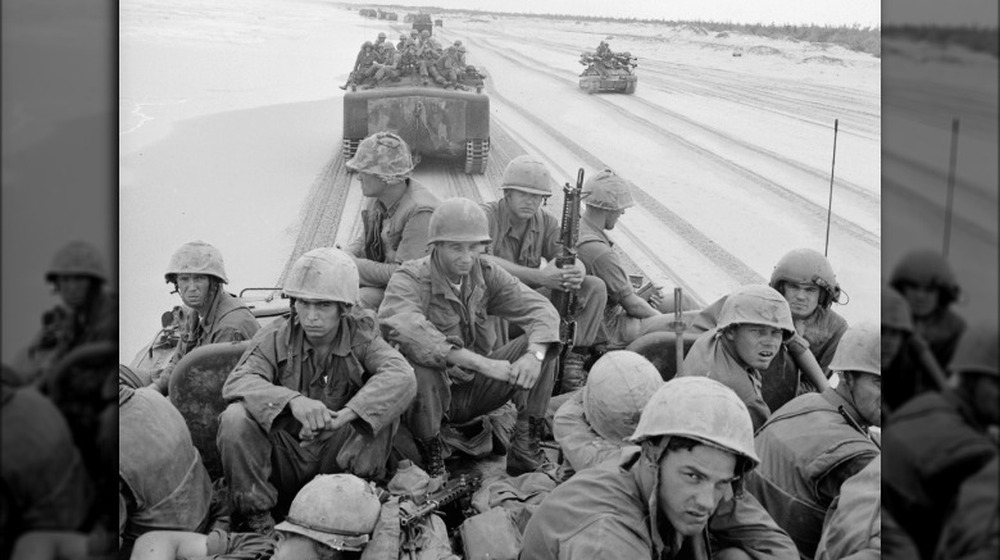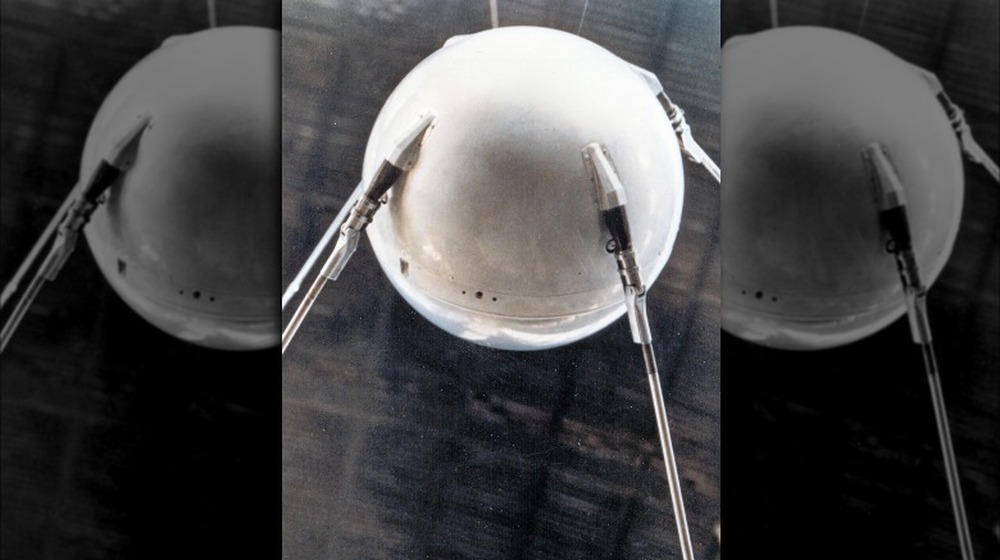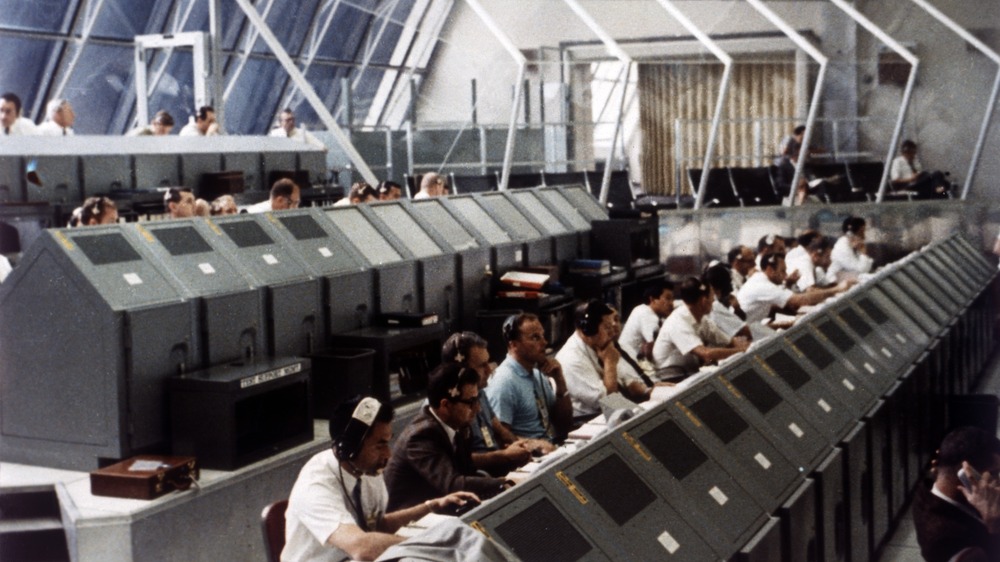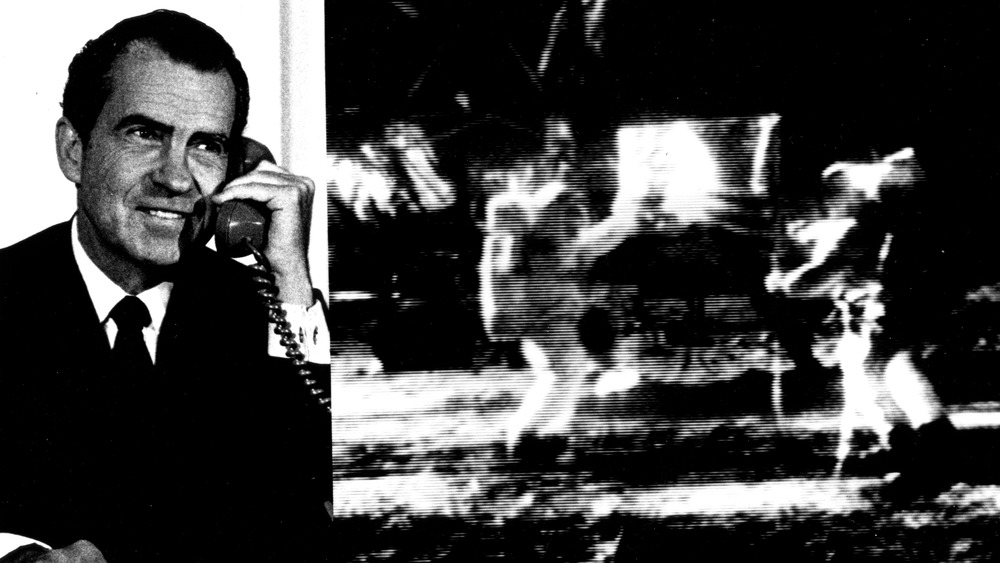What It Was Really Like To Watch The Moon Landing In 1969
July 20, 1969, is a day that's probably going to be in the history books forever. It's the day that humankind first set foot on a celestial body aside from good old Earth. Neil Armstrong, Buzz Aldrin, Michael Collins, Apollo 11 — those names are going to be remembered
The story of the Moon landing is one for the ages, and space is a topic that readily fascinates many — just the idea of what's out there, unexplored and unknown, and the respect and admiration for all the people who get to be a part of that.
This is probably why space missions are so widely watched and followed: Just think about the SpaceX launches and Mars rover missions that people watch live. It's honestly a lot of fun to see. So, with that in mind, what was it like the first time, watching man set foot on the Moon?
There were Moon landing parties (of the planned and unplanned varieties)
If there's nothing else to remember about how the Moon landing was viewed in 1969, the important thing is this: It was an event. A spectacle. According to the BBC, news stations across the US had put in millions of dollars into covering it every step of the way, with NASA more than glad to provide plenty of information.
So people threw parties. There are stories about "Moon parties," complete with appropriate Moon-themed foods, drinks, and snacks. Other parties were a little less organized but no less eventful. The Guardian, for example, reports on one person's account of how their friends and family all packed into the living room and gathered closely around the TV, glued to the screen and barely even able to speak.
And then there were the completely impromptu parties. People packed together on the streets of New York, trying to get a view of the screens as the Moon landing was about to take place, the usual noisy bustle of the big city suddenly turning to nervous whispers and near-silence in the moments before humankind's first steps on the Moon (via The New Yorker). The same thing even happened out in the woods of New Jersey. The New York Post details the story of a family on a camping trip: They'd set up an antenna to watch, and it didn't take long for around 50 people to appear and watch alongside them.
Nothing could compare to the Moon landing
Looking back, the Moon landing was huge. But the thing is, technically, July 20, 1969, was still just a normal day. To compare with something a little more recent as of this writing, it's not like the world stopped for the landing of the Perseverance rover on Mars. It's insanely cool, but other things were going on.
The same can be said when it comes to the Moon landing. Planned events were still happening, and the New York Post mentions some of those. People wrote in talking about how they were at other things during that historic moment. Baseball games were going on, and so were concerts. The Beach Boys were actually in the middle of their concert at the moment when Neil Armstrong set foot on the Moon. Another respondent was getting married that day.
Despite that, the Moon landing couldn't be avoided. In the middle of a baseball game, the announcer stopped everything to say that the landing had just occurred, and the entire stadium erupted into thunderous applause that lasted a full minute. The same happened for the Beach Boys concert and even the wedding — everything came to a halt so that everyone could have a chance to watch or listen to the Moon landing live. The Beach Boys stopped playing, and the wedding guests stopped dancing, because the Moon landing was just that captivating.
The astronauts seemed so close ... yet so far
There's just something about looking up at the night sky and at the Moon, and as it turns out, according to accounts in the New York Post and The Guardian, there's an extra something when you know people are up there.
One person talks about how they were young at the time and spent the Moon landing with their father, who told them that there were men on the Moon as they spoke. Looking up at the sky, it almost seemed weird that they couldn't see the astronauts, but knowing they were there was simply awe-inspiring. Another account talks about how everyone on a street in London was sticking their head out the window to stare at the Moon, imagining that they could see the astronauts there with the naked eye.
It's a small thing, but it makes a lot of sense. What else would you do when you're that filled with awe? Just think about it: knowing that there are actual, real people up in space, hundreds of thousands of miles away on this celestial body that's seemed unreachable until that point. Knowing there are people making history up on the Moon, something that's close enough to see in the sky but too far for the average person to imagine ever getting to visit. And knowing that's all happening as you look up at the night sky. It's bizarre, surreal and, yeah, awe-inspiring without a doubt.
Courage, inspiration, and change
The Moon landing was a seriously special event, not just for the scientific and historical accomplishments but for the almost unimaginable wave of optimism that came with it. As of this writing, there might not be any other event that's taken such a positive hold over so many people.
Those feelings are all over stories relayed by the New York Post and The Guardian, with many people recalling that they knew they were watching history in the making. They knew that this was something for the history books, and in a good way — it was the kind of thing that was synonymous with wonder, opportunity, and accomplishment. Those watching back on Earth felt like the world had just changed, or was about to change, for the better, that somehow, this event was a sign of a much brighter future, and everyone watching was right in the middle of it.
The Moon landing inspired on a smaller scale as well, making people feel like there were no limits, like no obstacle couldn't be overcome. Ed Charles, a baseball player for the New York Mets at the time, said that if a man could walk on the Moon, then they could win the World Series (which they did). A young student saw that Michael Collins had to wait, alone in the command module, on the dark side of the Moon and found courage to face their own fears from the fact that Collins was brave enough to do that.
The Moon landing put things in perspective
If you take a look at human technological advancement over the years, it's really, really impressive if you take the time to think about it. But it's not something that you're all that aware of as it's happening, unless there's a really good reason. And the Moon landing was on such reason.
People wrote in to the New York Post and The Guardian, talking about how they were watching the Moon landing with their grandparents. One person recalls that their grandfather basically refused to believe it was true, and why not? Some of the people gathered around TVs and radios that night had been alive since before the Wright Brothers made their first flight. The BBC recounts the story of a 13-year-old boy watching with his grandfather, who was born in 1893 and had grown up riding in horse-drawn carriages.
But then, all of a sudden, there was a man on the Moon. To go from the first-ever airplane to men on the Moon is an insane leap in technology, and for that to all happen within a person's lifetime really says a lot about just how far humanity had managed to come, and in a pretty short time, at that.
The moon landing brought a lot of pride in being American
This one's pretty self-explanatory. After all, there's video of an American flag being planted into the surface of the Moon, hundreds of thousands of miles in space, far from the country that it represents. According to NBC News, 93 percent of American households watching TV were watching the Moon landing. (It was 100 percent in New York City.) And the New York Post recounts stories from people who said they felt "high on America" after seeing the Moon landing.
But the more interesting recollections are from people who weren't from the US. A woman, Maggie, had moved to the US from Cuba and said that she would always remember what it felt like to see the American flag on the Moon. For her, it wasn't just general patriotic fervor but the fact that she felt lucky enough to be a part of it now and, more importantly, that this was the country her young son would grow up in.
Another story from a man named Stanislav Vortruba mentions that the Moon landing was (surprisingly) broadcast in then-Communist Prague. It was a show of human achievement at the time, but then his family was able to move to the US by the time of the Apollo 17 mission. Stanislav remembered his father feeling a different kind of pride watching that mission: pride for being American, and for being free.
But there was also pride in being human
According to NBC News, the broadcast of the Moon landing was pretty heavily geared toward American audiences — NASA is an American organization with American astronauts, and, well, this was also the Cold War. Despite that, though, the Moon landing and what it represented went a lot further than just the United States.
If nothing else, it was broadcast in a lot more than just American homes, being shown across Europe, Australia, South America, and Asia. The New York Post and The Guardian collected stories from Scotland to Portugal to Vietnam, all at different times of day; the first moonwalk actually took place in the middle of the night in the UK (via the BBC). Kids whose families didn't own TVs crowded into gyms to watch the broadcast, running around all the while, and others remembered that night being the longest they had ever stayed up, all to be able to see what was going on.
In general, no matter where people were watching from, they felt like everyone in the world — not just in the US — was making history. This was an achievement for all of humanity, one that crossed any and all divisions. The BBC even went so far as to call it a "genuine experience of global intimacy," and that honestly seems pretty accurate.
The Moon landing provided a brief respite from grimmer issues
To put things into perspective, the 1960s weren't exactly a great time worldwide, and the US was far from an exception. The short list of what people were dealing with? Tensions over segregation, riots, protests, and assassinations — most notably of John F. Kennedy and Martin Luther King Jr. The most recent Democratic National Convention had "descended into anarchy," as the BBC put it, and Nixon's presidency wasn't exactly well-received. Then, of course, there was the Vietnam War — notoriously disliked — and the ongoing Cold War in general. And when it came to the Space Race in particular, the Russians had already launched Sputnik more than a decade earlier, which had largely disheartened the American people (via the BBC and NBC News).
Yeah, things were rough.
So when the Moon landing happened, it really meant something. Even in lighter times, it would've been incredible, but when it feels like the world is slowly falling apart? The event was a beacon of hope in an otherwise hopeless time, a spot of good news amid the bad. It was a chance for people to forget about the world's problems for a little while and come together for something incredible, rather than be split apart by less savory events.
But why did the moon mean more than the Earth?
Even though a lot of accounts of watching the Moon landing are optimistic, that's not necessarily the case across the board because, well, the 1960s weren't the best.
The BBC mentions that civil rights leaders were upset because, sure, the Moon landing was cool, but what did that really do for the people on Earth? All of this money was being funneled into a program that wasn't going toward, say, feeding poor children or improving lives in the inner cities. According to them, it was a waste of money when there were more pressing and immediate (and terrestrial) matters to attend to.
The Vietnam War was the other big part of this. The New York Post tells stories from people directly affected by the war. A woman recalled the bittersweet feeling of seeing the Moon landing, knowing all the while that her fiancé was only days away from being sent off to war. And that was just compounded by the astronauts receiving a hero's welcome, while Vietnam veterans were treated with scorn upon their return. Then there was a soldier in Vietnam who was listening to the Moon landing over a transistor radio — just has his bunker came under enemy attack. It was hard to feel joy when the US could take men to the Moon but "couldn't figure out how to extricate half a million American kids from Hell."
The end of the Space Race
A lot of questions about watching the Moon landing in 1969 tend to focus on an American (or, generally, Western) audience because, frankly, it was pretty heavily skewed in that direction. But the context of the Moon landing is really rooted in the Cold War, so the Soviets had a really different reaction to the whole event, as Air and Space Magazine says.
The Soviet space program had started out especially strong — Sputnik, Russian cosmonauts being the first humans in space, and so on — but things didn't stay that way. Once the Apollo missions were underway, the Soviet Union was already far behind, with efforts to put a man on the Moon starting far later than the US. Management was a complete mess, with rules regularly broken, leaders locking horns with each other, and resources spread thin. Dangerously thin, perhaps. All the same, they were desperate to keep up with NASA's successes — so desperate that they just started ignoring early-stage testing for their spacecraft.
Now, that's a problem.
It culminated in the explosion of one of their rockets on the launch pad on July 3, 1969. At that point, the Soviets knew they'd lost the Space Race, even if they couldn't admit to it publicly. They had to keep the details of their successes a secret, but they'd also never been allowed to admit to the problems plaguing their space program.
Tensions were high at NASA
"Stressful." If there was one word to describe the atmosphere at NASA's Mission Control during the Moon landing, it's that one, without a doubt. It wasn't exactly smooth sailing, as CBS News tells it.
At one point, communications disappeared, and no one knew if they should continue the mission. Eventually, comms did come back, only for telemetry and radar data to disappear. Again, they had no information. By the time data reappeared, the Eagle was descending 20 feet per second faster than planned, not a fatal problem but nerve-wracking all the same: If it sped up any more, they would lose the option to abort. Their safety net was almost gone.
The computer corrected for that problem, and then an alarm came up in the lander for a rarely seen issue. For about 20 interminable seconds, no one could quite remember what to do. But it was okay; the mission was fine.
Armstrong would have to take manual control to land in a rocky area (they'd overshot their landing by a few miles), and that shouldn't have been a problem, if not for the fact that fuel was running out. Mission Control realized that once there was only about a minute's worth of fuel left and the Eagle was still high off the ground. If they'd run out too high above the surface ... that would have been bad.
Luckily, the fuel lasted just long enough for a safe landing, and the rest is history.
There were anxieties at the White House, too
A little while after the Eagle had landed, the astronauts received a call from President Richard Nixon — a call that Nixon himself deemed the most historic call ever made from the White House (via CBS News). Nixon also added that everyone back on Earth was proud of what they'd done and that they all hoped for their safe return.
It's emblematic of the joyful pomp and circumstance that the Moon landing is generally known for. But there is a slightly darker side to it. After all, it's worth remembering that space exploration is fraught with danger. The Apollo 1 fire ended up killing three astronauts, and that's just one such tragedy (via Space.com).
It's why there was some fear in the air of the White House as the Moon landing approached. Presidential speechwriter William Safire was told he should prepare a statement in case Armstrong and Aldrin, for some reason, couldn't get off the Moon, in case they couldn't make it back home. Safire was tasked with writing something the astronauts' families and the nation as a whole would need to hear to commemorate these men they saw as heroes. The fortunately undelivered speech is a reminder that space travel — for all its splendor — includes a lot of risk.
